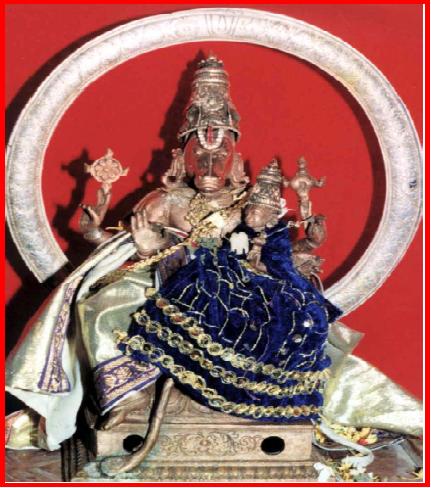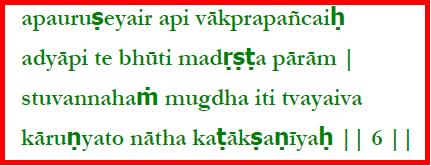
MEANING:
Oh Lord HayagrIvA! Veda-VedAnthams are not composed by anyone. They are apourushEyam (authorless and vast). They struggle even today in their efforts to describe adequately Your SvarUpam, ThirumEni and Your anantha kalyAna guNams; they cannot see the limits (shores) to the ocean of Your glories. Such is their magnitude of Your countless glories! Inspite of it, adiyEn has come forward boldly to sing about those limitless glories. It is indeed sheer foolishness on my part to engage in this impossible endeavour. Please consider me as one of Your children with limited intellect and shower on me Your mercy-laden katAkshams inspite of my saahasam (boldness). I am a fit object for Your auspicious and merciful katAkshams.
Here Swamy Desikan records his unfitness to engage in the act of praising the Lord’s glories adequately, when the great VedAs themselves find that impossible. Later, Swamy Desikan is going to refer to the futility of the VedAs trying to comprehend fully the glories of the Lord in GopAla Vimsathi (nigamAnthai: adhunApi mrugyamANam). In Sri VaradarAja PanchAsath (slOkam 2), Swamy Desikan refers again to his bold act (saahasam) in attempting to praise the Lord’s glories, while the Muni-SaarvabhoumAs of sharp intellect have given up:
yasyAnubhAvam adhiganthum asaknuvantha: muhyanthi apankura dhiyO Muni
Saarvabhouma:
While the greatest of Munis stagger from such an impossible task, Swamy Desikan says that he is engaged in such an act boldly out of foolishness and asks for the Karisaila Naathan’s pardon for the apachAram committed:
tasyaiva tE sthuthishu saahasam asnuvAna: Kshanthavya yEsha bhavathA Karisaila
Naatha
It is customary for Swamy Desikan to acknowledge his inadequacy to undertake the hopeless task of praising adequately the full glories of the Lord. In some sthOthrams, he will pray for the Lord’s blessings (Sri HayagrIva sthuthi) to undertake such an onerous task; in others, he will seek the Lord’s understanding and pardon (Sri VaradarAja PanchAsath); in some others, he will argue for his fitness as a logician. An example of such a case, where he says that he has the rights to praise the Lord in proportion to his yogyathai, is found in Sri Deva Naayaka Panchasath (SlOkam 5) :
nirvisyamana vibhavam nigamOtthamAngai:
sthOthum Kshamam mama cha dEvapathE bhavantham
gaava: piBhanthu gaNaSa: kalasAmbhurAsim
kim tEna tarNaka gaNAs thruNam aadhadhAnA:
Meaning:
Oh DaivanAyakA! Just as the Upanishads relish enjoying the act of singing Your glories, adiyEn also has the fitness to engage in such an act of eulogy. What if the herds of adult cows drink with gusto from the mighty milky ocean? Their little calves engage only in partaking small blades of grass as their invigorating food. Thus, adiyEn is singing Your praise in proportion to my meager intellect, while the great Upanishads engage in praising Your kalyAna guNams in a manner appropriate to their lofty stature.
Sri D.Ramaswamy Iyengar points out that Swamy Desikan is following the footsteps of his PoorvAchAryArs –AaLavandhAr, KurEsar and ParAsara Bhattar- in engaging in such act of NaicchAnusandhAnam.
Swamy Desikan describes the VedAs in this slOkam as apourushEyam (authorless) and Vaak Prapanchai: (immense branches and manthrams). Swamy points out that even these mighty and vast VedAs are unable to determine the limit of the Lord’s glories and are engaged in their futile searches even today (adhya api adhrushta paaraam tE bhUthi:). Your “bhUthi” or glories are of such limitless nature to comprehend and describe. While that is so, here I am as a foolish youngster (mughdha: aham) attempting to praise Your vibhUthis. Mughdha: means “aRiyAp piLLai” or a foolish fellow, who does not know what he is about to do. The word Mugdha: reminds one of opposite kind (Muktha:), who fully comprehends the true nature of Tatthva- Hitha-PurushArthams and crosses over to the other side of SamsAric ocean to praise the Lord with the blessings of the Lord Himself. Swamy Desikan therefore prays for the karuNA katAksham of Lord HayagrIvan to receive dhivya Jn~Anam to transform himself from a “mugdhan” to a “Mukthan”. His prayer is “KaaruNyathO Naatha KatAkshaNeeya:”
The salutation as “Naatha” is consistent with the prayer for the conferral of Dayaa by the “Naathan”. Only the One who has the power to confer His Dayaa is a Naathan according to Sri VaasudEvAcchAr Swamy.
Source
To be continued…









